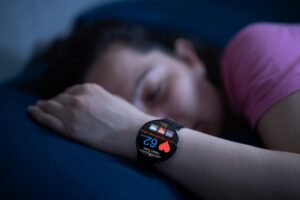
Sleep is a vital part of our everyday lives, yet many Americans struggle to get enough of it. According to the CDC, about one-third of adults don’t get the recommended seven or more hours of sleep per night. Lack of sleep can lead to a variety of health issues, including obesity, heart disease, and even depression.
In today’s fast-paced world, it can be tempting to sacrifice sleep to fit more into our days. However, prioritizing sleep is crucial for both physical and mental well-being. Making small changes such as going to bed and waking up consistently, turning off electronics an hour before bed, and establishing a relaxing bedtime routine can help ensure that you get the sleep your body needs.
To help with getting a restful night, sleep trackers are becoming more and more popular. However, some experts are questioning whether this common practice of self-monitoring sleep will result in a sleep paradox where it will create anxiety and stress and make it harder for people to get a good night’s sleep.
Sleep tracking works by using input such as sound, motion, and heart rate to indicate when someone is sleeping. This information calculates a sleep score and creates graphs to show changes over time. The apps accompanying the sleep tracker claim to be able to determine how much time is spent in light sleep, deep sleep, and rapid eye movement (REM).
Although the technology in sleep trackers is becoming better at detecting sleep and wake times, its reliability for classifying the sleep stages remains inconsistent. So, sleep trackers should be used as entertainment more than reliable medical devices.
Sleep trackers have led to a medical disorder called orthosomnia. This disorder is described as an anxiety phenomenon that affects people who obsess over the results of their sleep trackers. This can develop into harmful behaviors such as spending longer in bed, which can worsen sleep quality and quantity.
For most people, sleep trackers can be used to get an idea of sleep patterns, but they should not replace objective testing like an overnight sleep study in a specialized clinic.
Taking Simple Steps
The best way to ensure a good, quality night’s sleep is by taking simple steps to practice good sleep hygiene. These include turning off electronic devices two hours before bedtime, sleeping in a cool, dark room, and cutting caffeine off early in the day. Getting the proper vitamins and nutrients is also an excellent practice to help with sleep.
Sleep Sure Plus is designed to help promote optimal sleep and restfulness through a variety of ingredients. One of the most important ingredients included in this unique formula is melatonin. Melatonin is a hormone that is essential for the regulation of the circadian rhythm (the internal clock of the body). Sleep Sure Plus also contains valerian, one of the best natural ingredients for promoting rest and relaxation. These two essential ingredients are joined by another 6, which all work together to provide a better quality of sleep.